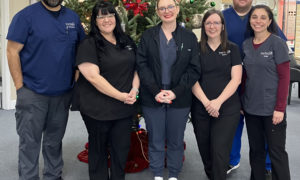By Diane Palombi, OD
Dec. 16, 2015
How healthy is your ego? Is it a little too healthy for your practice’s good? It’s easy to get carried away with the authority that comes with the “doctor” designation. Showing patients that you understand that their perspective is as important as yours, and that you don’t always have all the answers, is the first step to making a connection with them, and providing effective care.
You need an authoritative voice as a doctor, but one that always acknowledges and listens to the patient’s voice, and lets them know that you may not necessarily have all the answers.
I was recently at an event where a friend was complaining about a relative. This relative had recently earned his PhD. My friend noted that now this person feels like he knows everything about every subject, even when by his statements, he clearly doesn’t. My friend feels that this relative has let his degree go to his head.
Looking back to the days after obtaining my doctorate in optometry, I can empathize with this relative. When you are young, you hate to admit that you don’t know everything, especially in your field. You don’t what to come across to your patients as young and inexperienced. But it can go too far. We did not get a “G” to go along with our “OD.”
I’m retired from practice, andI recall thatone of the hardest things I had to learn to say to a patient is, “I don’t know.” However, I learned always to follow that admission with, “But I will find out for you.”
I also learned to give my patient options. There are still patients who say, “You are the doctor, so you decide,” but I found many patients like to be involved in their care. With the internet, patients are more knowledgeable than in the past. Sometimes they even present options that you may have not considered. Most of my patients liked the fact that I would not ram my opinions down their throat.
Doctors can be intimidating to their patients.My doctors are intimidatingto me. When a doctor would come in for an eye exam, I would treat them differently from a regular patient. I gave them a little extra respect and care. I would make certain that my staff and I would address them as doctor. The funny thing, though, is when I visit my own doctors, I don’t expect the same treatment that I gave my own patients with health care degrees.
I guess I have never let being a doctor go to my head. Now that I have been retired four years, I have even forgotten the fact, at times. My friends will ask me an eye-related question, and I’ll have to remind myself, “Oh, that’s right, I do know a lot about this subject.” Most of time I am just another carefree retiree enjoying the good life in Florida.
Let’s face the fact that most of us were probably the smart nerdy kids that got picked on in high school. Now that we can command respect from people because we are doctors, we like it. Just don’t let it go to your head.
How do you let patients know that you are not just an authoritative voice, but that you are interested in what they have to say, and that you won’t necessarily have the answer to every question they ask?
Diane Palombi, OD, now retired,owned Palombi Vision Center in Wentzville, Mo. To contact her: dlpod1@hotmail.com



























